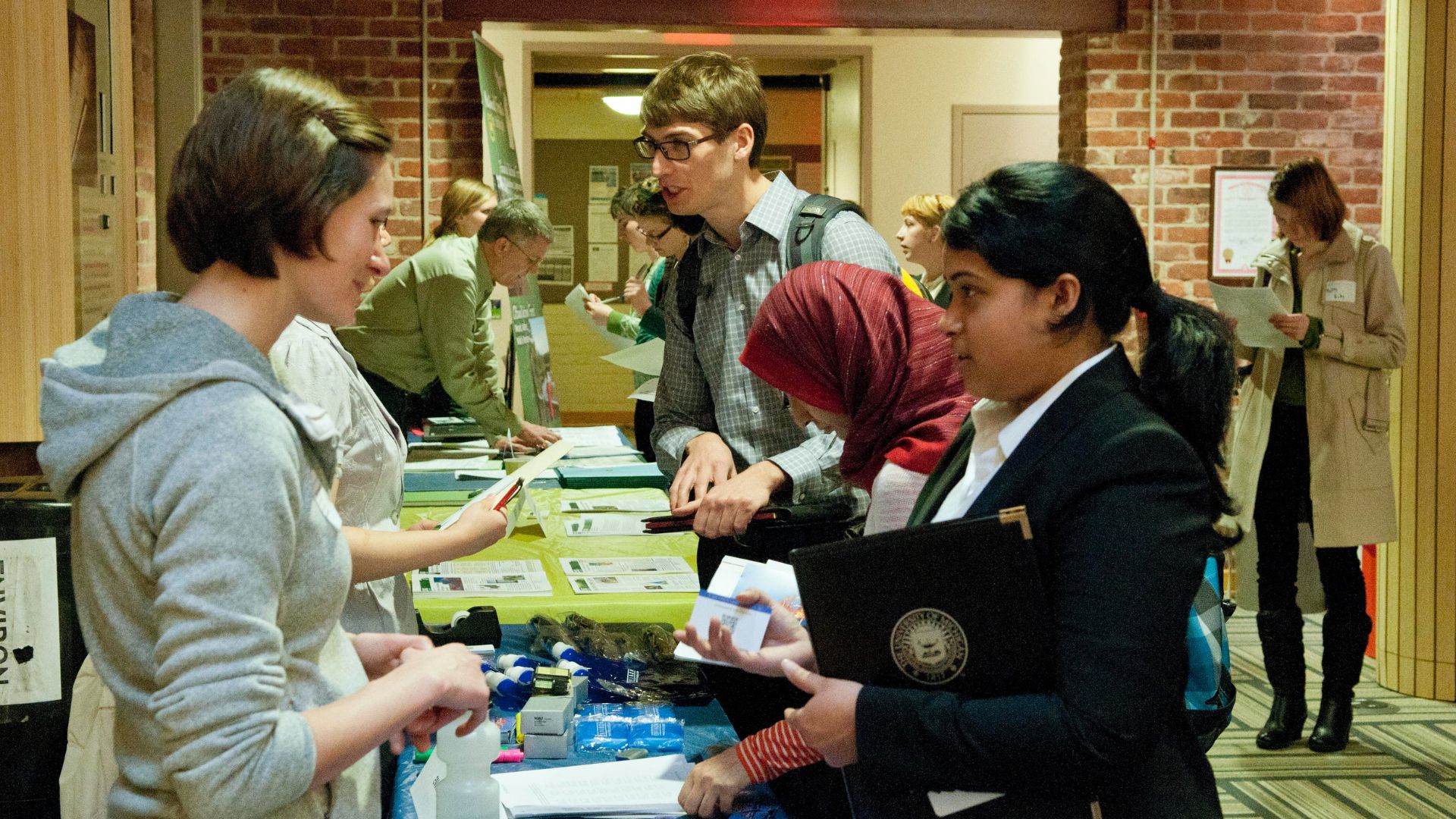Career services at U.S. universities guide international students on how to present their best selves to potential employers.
April 2023

Career services offices at U.S. universities often put together career fairs, talks, receptions and other events where students can interface with potential employers. (Photograph courtesy University of Michigan School for Environment and Sustainability)
For international students at American universities, adjusting to a new educational culture can be a challenge. Adapting to a new and competitive work culture after graduation can be equally daunting. With this in mind, U.S. universities offer a vital resource to help students transition from school to the working world—career services.
Priyanka Raut, a counselor at the University of Houston’s career services office, says they help students understand what the American workplace is like, what recruiting practices are for any given field, and “the very important difference between a résumé and a CV.”
“We also help them understand how to interview, search for jobs and internships, and make themselves relevant to the market they’re looking at for jobs,” she says.
Cultures and careers
In certain fields, paths to a promising career in the United States can look very different than in India. “In India, if you want to be an engineer or a doctor, you have to pass an entrance exam to get into a good school, and your scores are the only thing that determine your school,” says Raut. However, she says, in the United States, universities and employers look at many factors when choosing candidates. There is also more flexibility for those who want to change their subjects or career paths.
Working with career services can help students effectively present not just their technical accomplishments to employers, but soft skills like communication abilities, team-building, and negotiating as well.
“Based on my interactions with international students from India, a CV is considered to be the same as a résumé,” says Raut, “but in the United States, they’re very different documents. A CV is more focused on researching, teaching and publications, while a résumé focuses on internships, extracurriculars and skills. It’s very important for Indian students in the United States to understand the difference.”
Nirmita Roy, an electrical engineer who is currently studying for her doctorate at the University of South Florida (USF), took advantage of her university’s career services to craft a résumé that would grab employers’ attention.
“In India, you put every single detail, every project you’ve worked on,” she says. “I wasn’t sure how concise I was supposed to be, given my field.” She says her friends who work in the finance and business sectors had one-page résumés. “But was that true for me, too? I didn’t know who to ask, until I reached out to career services.”
Roy was thrilled with the help she received. “They looked up my background and gave me a coach who knew about careers and employers in electrical engineering, and who met with me one-on-one to answer my questions,” she says.
Ariadne Cheng, associate director for International Student Career Engagement at the University of Southern California, advises applicants to tailor résumés for the position they want. “Look at the job description and find the key skills, qualifications and even personal qualities that are listed for the position,” she says. “Highlight the ones that you have, and then make sure that all those points stand out in your résumé, both in the skills section and in the descriptions under your experience.”
Cheng further advises that students describe their professional, educational and volunteer experiences in an individualized way. “Whenever possible, try to quantify or demonstrate your impact in some way,” she says. Using specific numbers or milestones to show how important your efforts were is a great way to go, she adds.
Making connections
“Career centers put a lot of work into building relationships with employers so that those employers can serve as a resource for students,” says Cheng. “International students from India should take advantage of the opportunities provided by their career center to connect with and learn from these employers directly.”
Career services offices often put together career fairs, talks, receptions and other events where students can interface with potential employers. Students should also take advantage of school mentorship programs and apply to any for which they are eligible, Cheng advises. “Adjusting to college life can be hard, especially for international students, and having a mentor who has been through it to help guide you can make the experience so much easier,” she says. “Even if your school doesn’t have a formal mentorship program for international students, don’t be afraid to reach out to alumni—you may be pleasantly surprised to find they are happy to help and offer advice.”
Roy advises that Indian students should take advantage of any and all opportunities career services make available. “Even the smallest career services workshop can help you, and it’s already covered by your tuition, so you really don’t have a reason not to go,” she says. “It can be a stepping stone to get you started on your career. Especially if you’re from another country, career events can help you get over culture shock, learn how to talk with employers, and really get a grip on how things work in the United States.”
Getting started
Whatever your career path may be, Cheng says it’s never too soon to visit your school’s career service office and start planning.
“As an international student, you have more to think about when job- and internship-searching because of U.S. immigration laws. So it’s best to begin familiarizing yourself with the process and planning your career path early,” she says. “Your school’s career center will have resources for every step of your career path, from major and career exploration all the way to job offer negotiation, so you don’t have to do any of it alone.”
Michael Gallant is a New York City-based writer, musician and entrepreneur.
COMMENTS